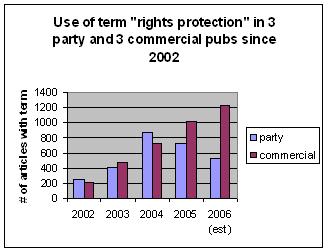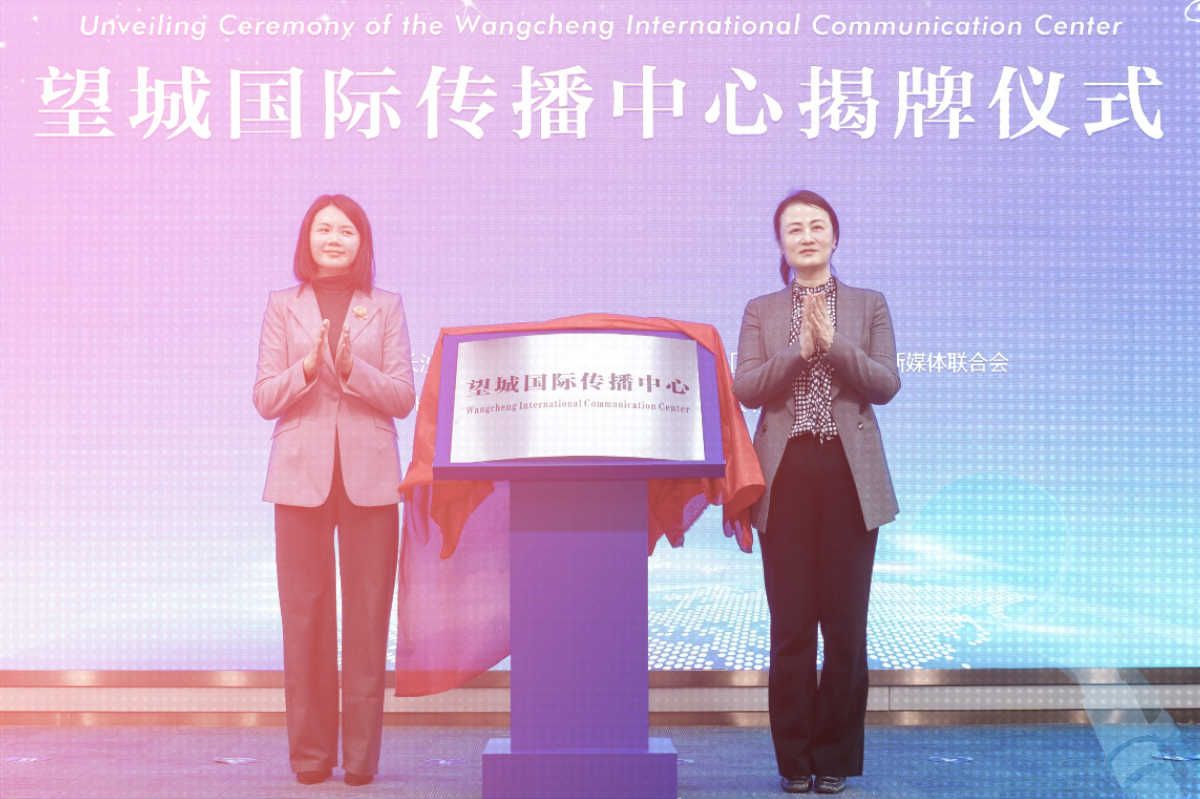Headlines and Hashtags
Discussion of “rights” and their protection on the rise in Chinese media
Chinese media seldomly use the highly sensitive term “human rights” (人权) to talk about China’s own rights issues, but the use of a stand-in term, weiquan (维权), roughly translated “rights protection”, has risen rapidly in recent years as media have turned to such issues as public health, land rights, the rights of migrant workers, etcetera. The rapid climb in use of the term “rights protection” suggests growing attention within China, particularly among commercial media, to a range of issues like those mentioned above as they pertain to citizens’ rights.
Looking at the term “rights protection” as it appears in three party publications and corresponding commercial publications since 2002, the numbers show not only growing attention to rights issues, but also a growing gap between coverage at party and commercial media. In 2002, use of the term was roughly neck-and-neck, with commercial publications accounting for 45 percent of the total. Commercial publications accounted for close to 60 percent of uses last year, and this year 72 percent. There are also marked differences in use of the term between party and commercial publications, a topic for another time.

[Search for the party publications People’s Daily, Nanfang Daily and Sichuan Daily and their corresponding or other regional commercial publications, Jinghua Times, Southern Metropolis Daily and Huaxi Dushibao.]
One focus of the rights protection issue, particularly visible at commercial publications, is the need for specific legal safeguards for citizens’ rights and the need for the government to take a more service-oriented approach to the public, as opposed to a paternal, authoritarian role.
In the following editorial from the Yangcheng Evening News, a Guangzhou-based commercial newspaper, the writer accuses government officials of neglecting citizens’ rights when considering policy measures, pushing off rights protection with a dismissive, “We will take it into consideration”. The editorial is relevant to a number of policies in the news lately, including China’s proposed real-name Web registration system.
The Yangcheng Evening News editorial follows:
“When things are “taken into consideration” and not guaranteed in law this is a “neglect” of rights”
Yangcheng Evening News
December 9, 2006
Government offices, when faced with public opinion, are particularly fond of saying, “We’ll take it into consideration”. For them to say this is to shove their own obligations onto the people. When [the people’s] responsibilities are clearly documented, but their rights and benefits are stuck at the point of “being considered”, where do we stand?
[China’s] personal income tax declaration system is right around the corner.. Because this system puts the onus largely on the citizens themselves, the government is promoting the system actively to the population. Wang Jiping (王纪平), director of the Beijing Municipal Tax Bureau revealed [recently] that when they assess personal income tax they will take into consideration the taxpayer’s overall family income (12/7/2006 The Beijing News). In the example of a family of four, in which the two elderly parents do not have incomes, the grandson is in college and the father makes just over the assessable minimum of 1,600 yuan, because the family’s overall income is low, the tax bureau will take into consideration not charging tax, making sure the end result is fair.
For tax assessors to assess tax on the basis of overall household income is of course much fairer than the current system . . . By all appearances, the tax authorities wish to show with this [idea of] “[we] will take overall household income into consideration” that the personal income tax assessment process is ethical and legal. The secret script here is: you guys [the citizens] take the lead in filing your taxes and the tax bureau will take into consideration your overall household income. To tell the truth, I object to the government occupying a commanding position and setting its own rules with this “we will take it into consideration”. On what basis is the public to believe that you will “take it into consideration”? Rights and benefits must be made clear in articles of law before anything can be anticipated.
Recently more than a few government departments, when faced with public opinion, have grown fond of saying “we’ll take it into consideration”. Take the real-name Web registration system for example. Faced with concerns that the public registering their real names might constitute a violation of their privacy, the relevant offices responded [that they] “would take protection of privacy into consideration when implementing [the system]”. To offer another example, as many areas installed close-circuit surveillance in public places [in recent years] no prior measures were taken to protect personal privacy. The answer from relevant government offices was again, “we’ll take it into consideration”. In levying fuel surcharges, the Civil Aviation Administration said it would take into consideration the public’s ability to support them. When water prices in Beijing were to go up, it was said that the needs of the poor would be taken into consideration. During breeze sessions for various price increases the Development Reform Commission also said that next year price increases for various energy products would not come all at once, that price adjustment proposals would take into consideration the ability of the people to support them.
The popularity of “we will take it into consideration” among government offices underscores the weak standing of public rights. All of these things the government says it will “take into consideration” are rights the public should by law enjoy — like privacy under a real-name registration system, like privacy under camera surveillance, or the right to survival under increases in public commodity prices, etcetera. When things are to be “taken into consideration” by government authorities, this signals that rights lack specific institutional and legal protection, that officials are free to handle things as they please, and [we are simply to] trust that good and just officials will “take the rights of the public into consideration”. But how exactly will those officials with a hold on power take things into consideration? Fuel prices have gone up repeatedly, water prices are going up everywhere, and news of rising energy prices is everywhere too – have these officials really taken into consideration the public’s ability to support these? We can’t depend on officials to take things into consideration. Rights and fairness must be realized through means visible to us all, particularly the law.
When many government offices say to the people, “We will take it into consideration”, this is shrugging off their duty. For them to say, for example, that they “will take into consideration the total household income of the taxpayer”, this means the onus is entirely on the public in declaring their personal tax; when they say they will “take personal privacy into consideration”, this means the onus is on the public to be monitored by cameras. [But when] the responsibilities [of the citiznes] are written out clearly, and it is left to officials to “take into consideration” our rights, this is unfair. Actually, rights and obligations should both be written equally onto paper. We can’t set rights aside in the unreliable realm of that which is to be “taken into consideration”. In creating real-name Web registration or public camera surveillance regulations, it should be laid out clear in the regulations themselves how exactly the public’s right to privacy is to be protected. Only when privacy is protected does real-name registration constitute a just obligation. When personal income tax is assessed and the total household income of the taxpayer is taken into consideration, rights should be balanced by a system and should not be up to the consideration of government offices and those carrying out the process. It should be the same way with price increases for various public commodities, and the public should stand up and appeal directly for their rights when faced with price increases. They should not wait idly for others to “take things into consideration”.
[Posted by David Bandurski, December 12, 2006, 1:17pm]





















